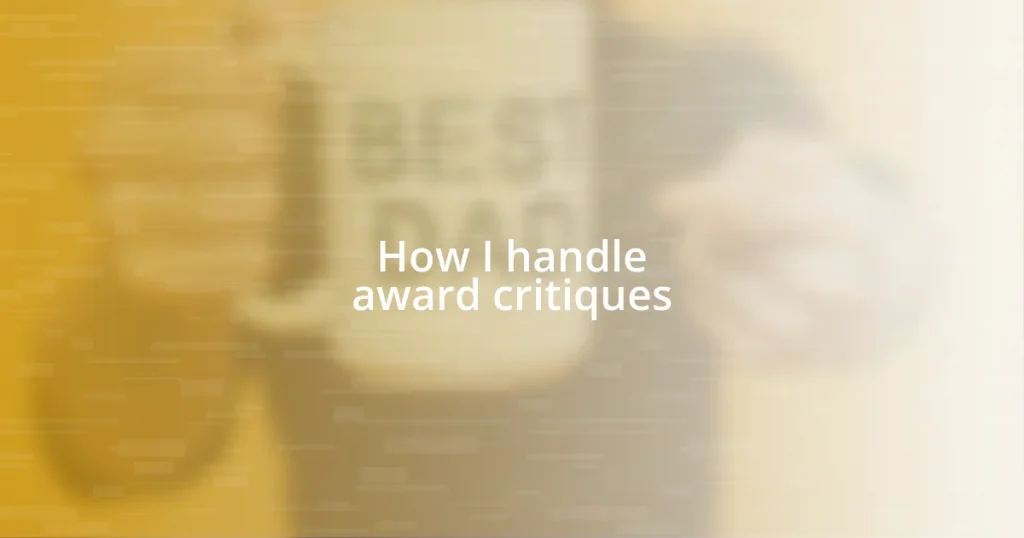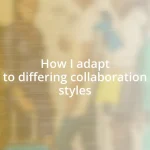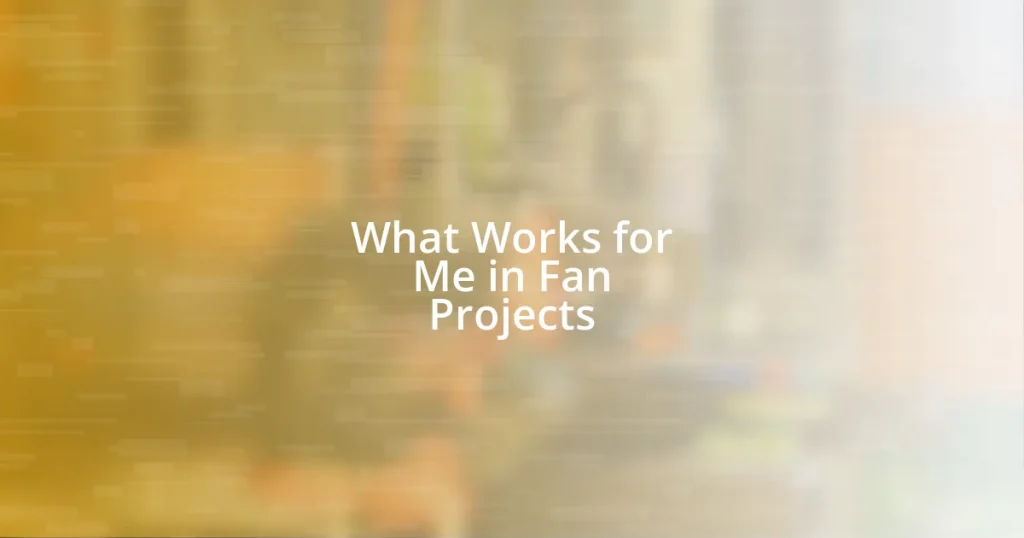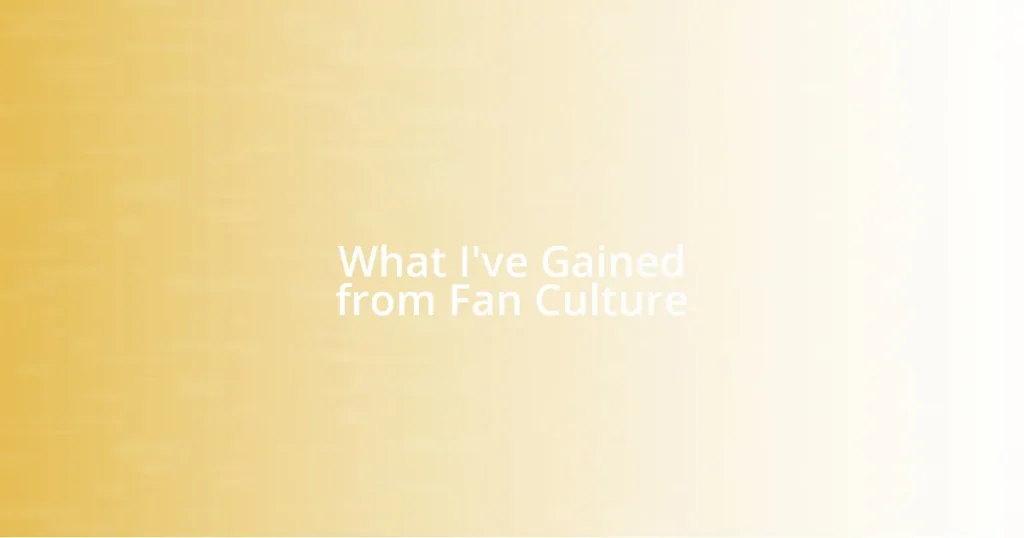Key takeaways:
- Critiques offer constructive feedback that can reveal blind spots, fostering personal and creative growth.
- Preparing for feedback with an open mindset and active listening enhances the appreciation of constructive criticism.
- Implementing feedback requires an adventurous approach, involving reflection, trial and error, and a willingness to step outside one’s comfort zone.

Understanding award critiques
Understanding award critiques is essential, as they serve as constructive feedback rather than mere judgments. I remember my first critique; it stung at first, but I realized later that the reviewer’s insights helped me grow. Have you ever faced criticism that initially felt harsh but ultimately shaped your perspective?
When I received my first big critique, I was stunned. The reviewer pointed out flaws I couldn’t see. It took me days to grasp their significance, but eventually, I saw the value. This experience taught me that critiques are often reflections of the judge’s expertise and could reveal blind spots in our work. How could I have overlooked those areas? It’s a humbling realization that we all have room to improve.
Through understanding award critiques, I’ve learned that they can open doors to new ideas. Each piece of feedback becomes an opportunity for dialogue with the reviewer. I now ask questions about their suggestions, seeking clarification to truly understand their perspective. This exchange not only enriches my work but also builds a connection that can be invaluable in the creative community. Have you ever engaged in a dialogue that transformed your understanding of your work?
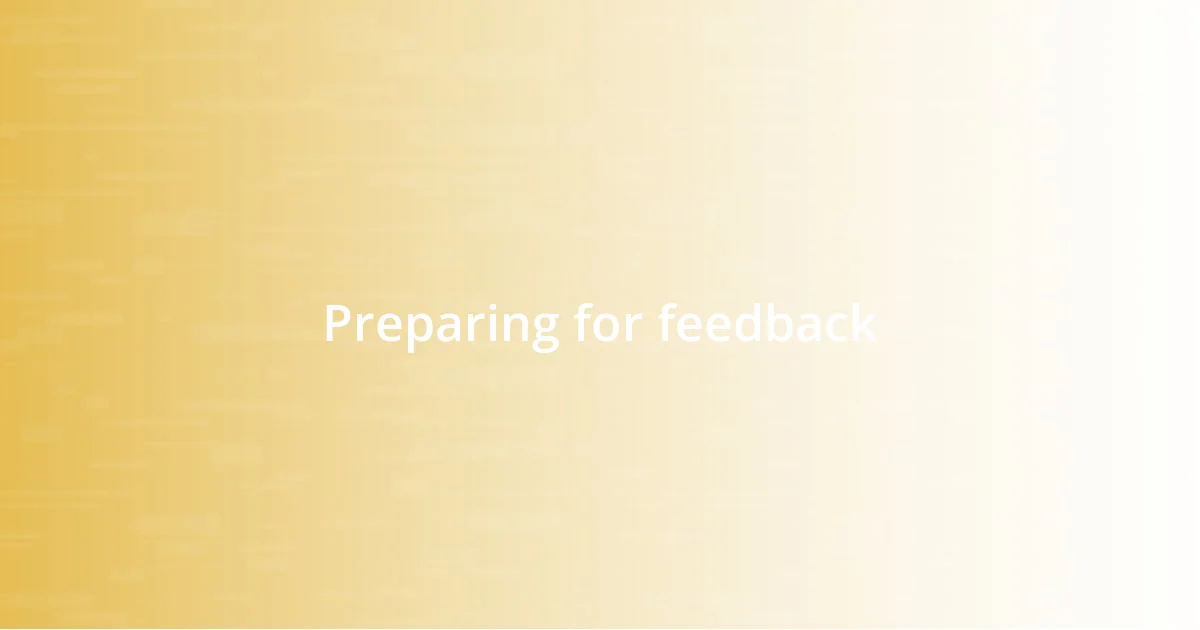
Preparing for feedback
Preparing for feedback is a delicate process that requires a mindset shift. I recall a time when I set aside my defenses and approached feedback sessions with genuine curiosity. Instead of bracing for impact, I leaned into the experience, which ultimately transformed my perspective. Each critique felt less like a personal attack and more like an opportunity for growth.
To make the most of this process, I’ve developed a simple checklist that helps me prepare:
- Set an intention: Decide what you want to gain from the feedback—be specific.
- Choose the right environment: Find a comfortable setting where open dialogue can flourish.
- Stay open-minded: Remember, each opinion is a stepping stone to deeper understanding.
- Practice active listening: Focus on understanding, not just responding.
- Follow up: Don’t hesitate to ask questions for clarification or examples.
By establishing these practices, I’ve learned to embrace feedback as an essential part of my creative journey rather than something to fear. The vulnerability this process demands is powerful, and it continually reshapes my work for the better.

Evaluating the source of critiques
Evaluating the source of critiques is crucial to understanding their weight and relevance. I’ve found that the background of the reviewer can deeply influence how I interpret feedback. For instance, when I receive critiques from industry professionals, I often weigh their opinions more heavily, as their experiences are likely rooted in a thorough understanding of the field. On the flip side, when feedback comes from someone less familiar with the specifics, I take it as a different kind of input—useful but perhaps less authoritative.
Another aspect I’ve learned to consider is the reviewer’s intention. Are they providing feedback to uplift and improve, or do they seem more focused on tearing down the work? I recall a situation where a critique felt unnecessarily harsh, but upon reflection, I realized the reviewer was simply frustrated with their own creative struggles. This understanding shifted how I processed their comments; I transformed the initial sting into a moment of empathy. Their critique became a reminder that everyone brings their unique challenges to the table.
Lastly, the context in which critiques are given plays a significant role. A comment shared in a supportive workshop has a different vibe than one delivered in a competitive setting. I once presented my work in a high-stakes competition, and while the critique was tough, I accepted that the environment contributed to the severity of the feedback. In essence, I learned to assess the circumstances surrounding critiques before jumping to conclusions about their validity or impact.
| Source of Critique | Weight of Opinion |
|---|---|
| Industry Professional | High |
| Peer or Hobbyist | Moderate |
| Anonymous Online Critique | Variable |
| Context (competitive vs. supportive) | Influences interpretation |

Responding to constructive criticism
Responding to constructive criticism is an art that I’ve honed over time. I remember one instance where a mentor provided feedback that was difficult to swallow. Instead of pushing back, I took a deep breath and asked for clarification on their points. This sparked a dialogue that transformed my initial resentment into actionable insights, reminding me that engaging with criticism can truly enhance my work.
I often find myself reflecting on how my emotions resonate with the feedback I receive. When critiques come from a place of care, I’m more inclined to listen. There was a time when I received a critique that felt more like a slap in the face, but I realized it stemmed from the reviewer’s own insecurities. Recognizing this helped me detach emotionally and focus instead on the valuable lessons tucked within their words.
Taking the time to respond thoughtfully is essential. After receiving feedback, I like to jot down my immediate reactions, both positive and negative. This practice creates a space for reflection. I once spent the night pondering over a harsh comment, only to awaken with a fresh perspective that highlighted its validity. Have you ever found that a night’s sleep can shift your viewpoint? It’s remarkable how time can turn a sharp critique into a constructive conversation with yourself.
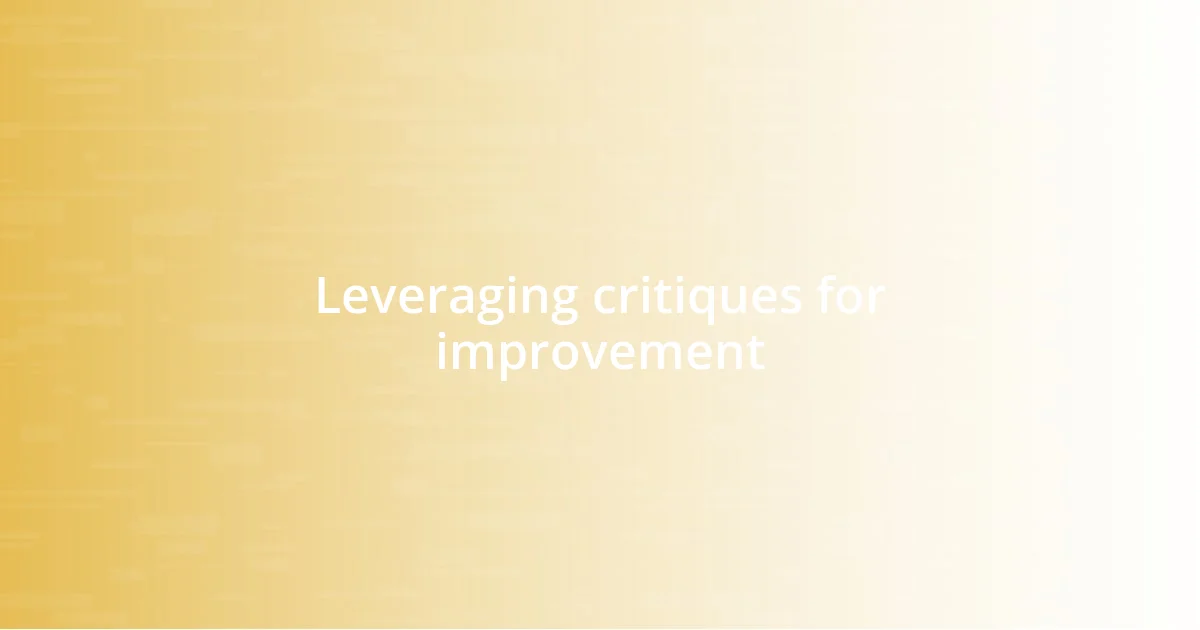
Leveraging critiques for improvement
Leveraging critiques for improvement is about translating feedback into actionable steps. I remember a time when a judge at a competition pointed out that my project seemed rushed. Initially, it stung a little to hear, but their observation motivated me to revisit the piece. I found myself dissecting my approach, breaking it down into smaller sections to ensure clarity and depth. Have you ever felt that energy shift from hearing criticism to wanting to improve? It’s exhilarating.
I also discovered that categorizing critiques helps immensely. When I receive feedback, I mentally sort it into constructive, neutral, and unhelpful. This practice has illuminated how I approach revisions. For example, after receiving a seemingly harsh critique on a presentation, I categorized it as constructive. I focused on their suggestion to enhance my visuals. I spent the weekend revamping my slides, which not only improved the presentation but also boosted my confidence. That moment taught me that what feels like a setback can inspire breakthrough creativity.
There’s a special power in re-evaluating my work post-critique as well. After absorbing feedback, I often set aside my initial feelings and revisit the project with fresh eyes. One time, after pondering a colleague’s suggestion to change my tone, I returned to the piece with an open mind. I reshaped it, and it turned out to resonate better with my audience! Isn’t it funny how a little distance can breathe new life into your work? I genuinely believe that the key to growth lies in how we choose to interpret and implement critiques.
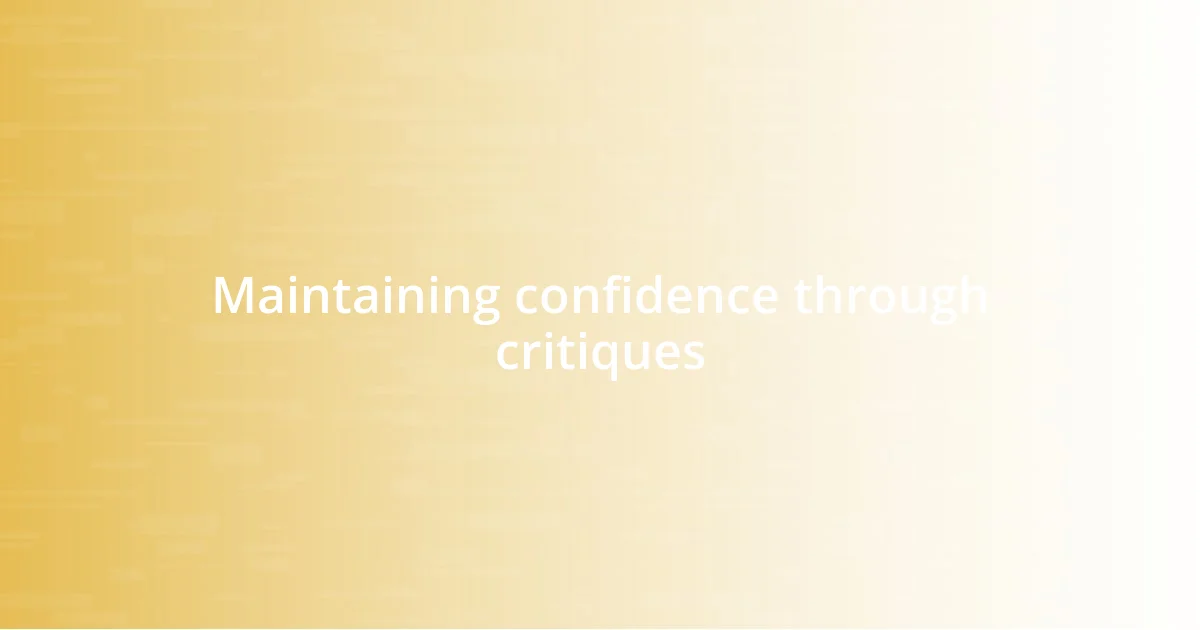
Maintaining confidence through critiques
Maintaining confidence through critiques can be a challenging journey. I distinctly recall a time when I received a critique that knocked the wind out of me. Instead of wallowing in self-doubt, I took a moment to ground myself and remember my strengths. It was like a mental reset that reminded me that one person’s opinion doesn’t define my worth or abilities. Have you ever had to remind yourself of your own strengths after receiving feedback?
Embracing critiques as opportunities rather than setbacks is an empowering shift I’ve adopted. I once had a peer whose review felt particularly harsh, but I decided to focus on the potential for growth. I reframed my thoughts, asking myself, “What can I learn from this?” By doing this, I transformed my initial defensiveness into curiosity, which boosted my confidence as I approached my next project.
I’ve discovered that sharing critiques with trusted friends can foster a sense of support. After experiencing a particularly tough review, I gathered a few close colleagues and opened up about it. Their perspectives helped illuminate the constructive elements I had missed and made me realize I wasn’t alone in feeling vulnerable. Reflecting on this, I wonder how many of us are quick to isolate ourselves rather than seeking connections that can bolster our confidence during critiquing moments.
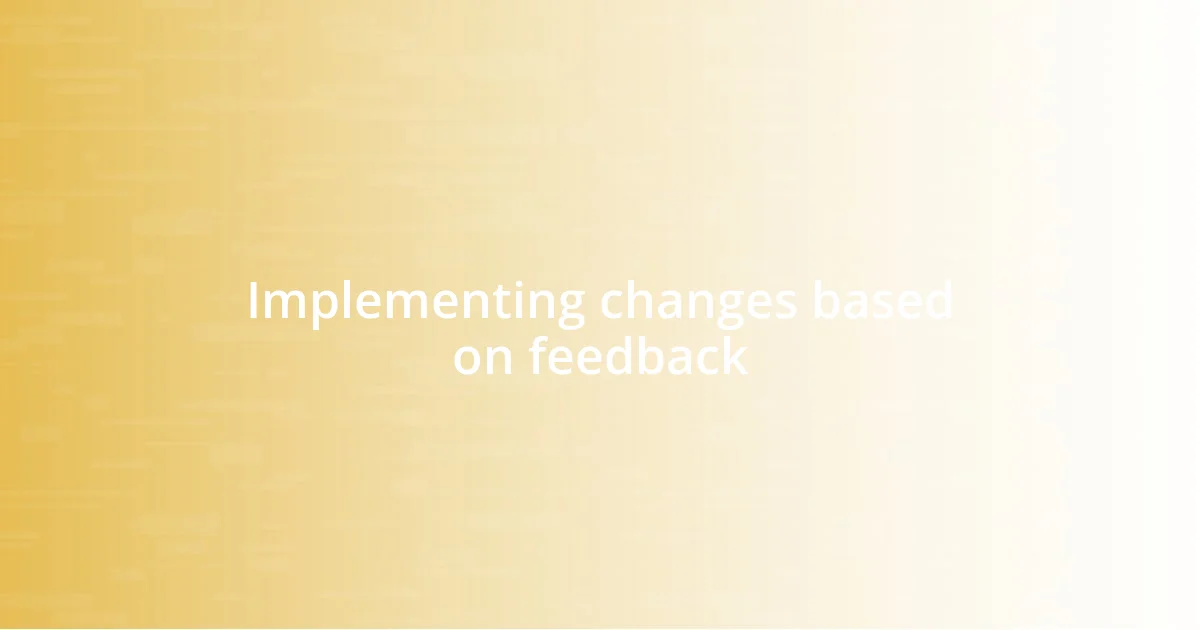
Implementing changes based on feedback
Implementing changes based on feedback is an adventure in itself. When I received a suggestion to reconsider the pacing of my writing, I found myself diving deep into the rhythms of my words. I remember spending a Saturday afternoon just reading my piece aloud, letting the flow or lack thereof wash over me. It was a revelation! How often do we truly hear our own voices in our work?
At times, implementing feedback feels like navigating uncharted waters. I vividly recall an instance where I was advised to be bolder in my conclusions. It felt daunting at first—what if my ideas were too radical? Yet, I decided to lean into that discomfort. I experimented with more assertive language and suddenly found my passion shining through in ways I hadn’t expected. Have you ever hesitated to step outside of your comfort zone, only to thank yourself later for the journey?
I also believe in the power of trial and error when transforming critiques into tangible changes. After a mentor pointed out gaps in my argument, I wrote multiple drafts, each time refining my points. Sure, it was a bit overwhelming at first, but every iteration brought clarity. Reflecting on those experiences makes me wonder—how many times do we shy away from the messy, iterative process simply because it feels safer to stay in our bubble? Embracing that complexity has often led to the most rewarding outcomes.










